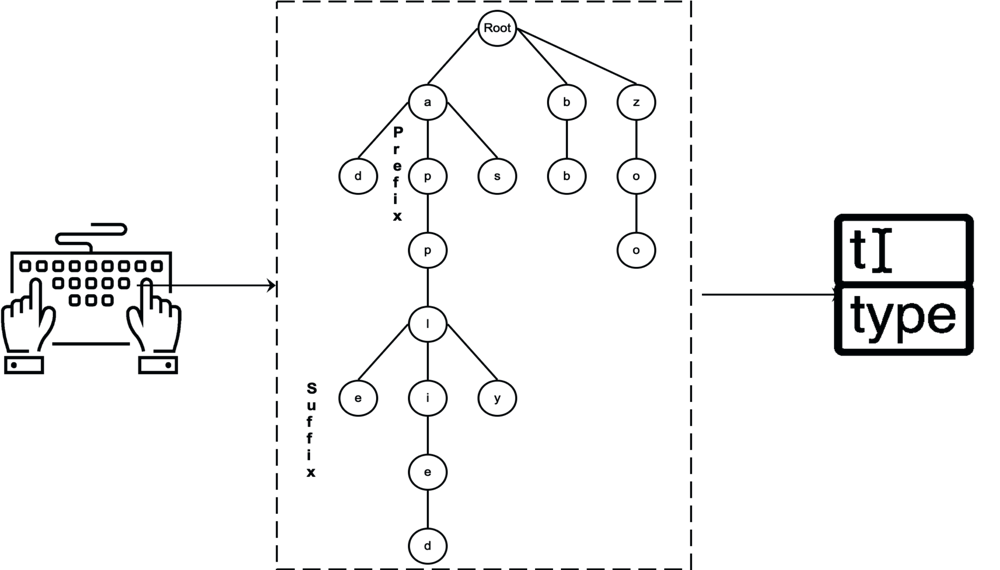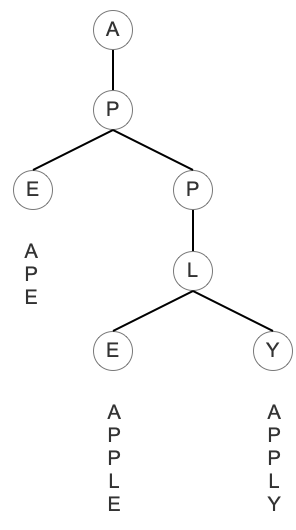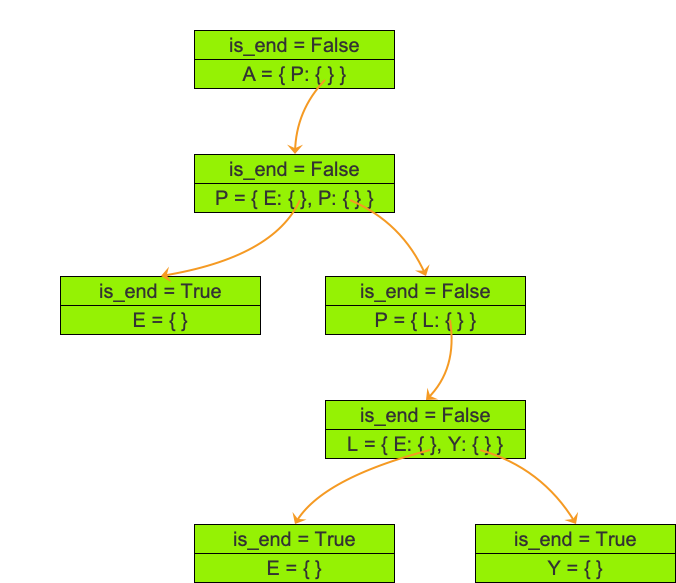May 15, 2020 ( last updated : May 15, 2020 )
Search
Trie
String
Data Structure and Algorithm
Python
https://github.com/cao-weiwei/
Today, let’s check a data structure named Trie. It’s also called search trie or prefix trie, which is mainly used to handle string related problems.
As we have known, the balanced binary search tree will give us O(logN) time complexity in search/insert/delete, which is efficient. We can use this idea to create a variant of the tree, called Trie to improve the efficiency of queries in strings, like searching prefix of a word. Trie is very useful in our daily usage of computers like auto-complete in search engines.

For example, for words “apple”, “ape”, “apply”, we will pre-process all the characters and save each alphabet in a trie node to form a trie as below:

As we can see, even “apple” and “apply” are two words, we only store prefix “appl” once. The ame prefix of a string will show only once in a Trie and this property will help us:
- to find common prefix by a given string and
- to get all suffix by a given string efficiently.
For example, suppose we have a Trie build by all alphabets, which means the size of each level is 26. If we want to find a word “book”, we just need to search 26 * 4 times. To be more mathematicly, we can say search in a Trie will cost O(K * M), K is the size of the alphabet and M is the length of given string parameter of the operation.
Next, let’s jump onto how to implement this in Python.
Trie Node
Before we design the Trie, it’s better to give the data structure of trie node. A trie node is to store the data, which holds any additional data associated with the current node and a flag to represent that a word ends at this node.
class TrieNode:
def __init__(self):
"""
Initialize a trie node
"""
self.data = dict()
self.is_end = False
Now let’s look at the previous Trie in detail, below is what we will create in Python:

Trie
During the class Trie, we need a root to start operations.
class Trie:
def __init__(self):
"""
Initialize a root of a trie
"""
self.root = TrieNode()
Insertion
The insert() method will put a word in the Tire and set the flag as True which means current path is representing a complete word.
def insert(self, word: str) -> None:
"""
Insert a word into a trie
:param word: str
:return: None
"""
cur_node = self.root
for w in word:
if w not in cur_node.data.keys():
cur_node.data[w] = TrieNode() # if a character is new to the trie, just append it as a new trie node
cur_node = cur_node.data.get(w) # else going deeper until at the end of a path
cur_node.is_end = True
Search
search() method will check a word whether in the Tries, if existed return True, otherwise return False. It will go through the dictionary by checking the keys.
def search(self, word: str) -> bool:
"""
Search the word whether exists in the trie
:param word: str
:return: True if the word exists otherwise False
"""
cur_node = self.root
for w in word:
if w not in cur_node.data.keys():
return False # if cur_node doesn't contain this character, which means given word doesn't exist in trie
cur_node = cur_node.data.get(w) # going deeper for search the character
return cur_node.is_end
Check prefix
This method will identify whether the given prefix exist in a Trie.
def start_with(self, prefix: str) -> bool:
"""
To determine whether there is any word in the trie that starts with the given prefix.
:param prefix: str
:return: True if the prefix exists otherwise False
"""
cur_node = self.root
for w in prefix:
if w not in cur_node.data.keys():
return False
cur_node = cur_node.data.get(w)
return True
Auto complete
This is not a strict feature of auto-complete, however it basically implements the key feature which will return a list contains number of words of the given prefix.
The logic is:
- do some edge cases check first
- then using backtracking techniques to enumerate all possible words
def auto_complete(self, prefix: str) -> list:
"""
get all words started with given prefix
:param prefix: str
:return: a list of words in the trie that starts with given prefix
"""
def _get_keys(word: str, node: TrieNode) -> list:
"""
using backtracking technique to collect all words with given prefix
:param word: str
:param node: TrieNode
:return: a list of words in the trie that starts with given prefix
"""
word_list = []
if node.is_end: # at the end of the search trie, put a word into the answer list
word_list.append(word)
for key in node.data.keys(): # go back to traversal all possible paths
word_list.extend(_get_keys(word + key, node.data.get(key)))
return word_list
words = []
if not self.start_with(prefix):
# no such prefix in the trie, return empty list
return words
elif self.search(prefix):
# or the prefix is a complete word, just return a list contains the prefix
words.append(prefix)
return words
else:
# to search all the words in the trie with given prefix
cur_node = self.root
for chars in prefix: # to find the last ancestor in the trie
cur_node = cur_node.data.get(chars)
return _get_keys(prefix, cur_node)
Here are some references may help you 🤓:
| [Trie | Insert and Search](https://www.geeksforgeeks.org/trie-insert-and-search) |
If you want to assess your understanding of Trie, please check this👉208. Implement Trie (Prefix Tree)
If you like my articles please give me a star or leave comments below, thanks!
Originally published May 15, 2020
Latest update May 15, 2020
Related posts :
- Algorithms - Brute Force Searching
- Data Structure - Quick Review of Priority Queue
- Data Structure - Single Linked List in Python
- Build a snake game in Python Day-6
- Build a snake game in Python Day-5
- Build a snake game in Python Day-4
- Build a snake game in Python Day-3
- Build a snake game in Python Day-2
- Build a snake game in Python Day-1
- Python3实现火车票查询工具